#Edinburgh's Disgrace
Explore tagged Tumblr posts
Text
The Disgraced Prince
CHAPTER THREE: The Duke of Edinburgh
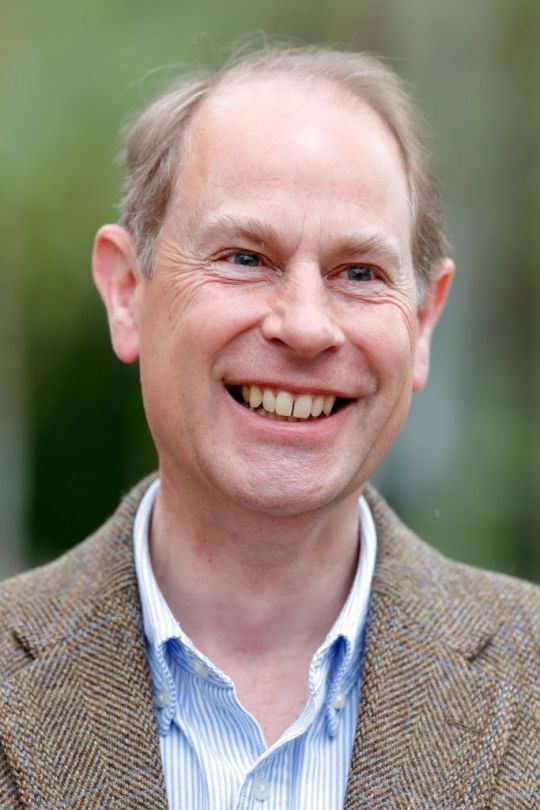
Featuring Prince Edward, Duke of Edinburgh and Prince Andrew, Duke of York
Apparently, Prince Edward, Duke of Edinburgh and his wife, Sophie had been privately concerned about Andrew and wanted to check on him after it is revealed Duke of York will likely not participate in Coronation. So while The Duchess of Edinburgh took her late father-in-law, Prince Philip's carriage out in Windsor this morning; her husband Prince Edward joined his brother Andrew on his weekly Windsor horse-riding trip for the first time in a number of years. When I arrived, I saw the brothers laughed and smiled as they moved around the sprawling estate, on the eastern side of Windsor Castle.

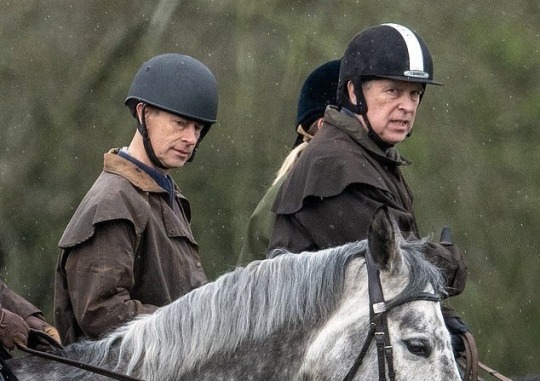
Not wanting to disturb them, I went to the nearby stable knowing that Andrew would come back groom his horse. To my surprise, I found Edward had returned first, not his brother. When he saw me, his eyes quickly did a once over on me before "hello" and a wave of his hand. I smiled and greeted, "Hello, Your Royal Highness."
The Duke of Edinburgh was nice and gentlemanly as I studied him while we chatted. Your typical Windsor male in his late 50s, balding brown hair with a thin frame concealed in a long, brown coat. He bears a striking resemblance to his father the previous Duke of Edinburgh with a cute, nerdy quality to him. Apparently, he was a real looker back in the day and yes, he pinged to high heaven. With his beloved parents are gone, his brother, King Charles III, is on a tear to economize the BRF and his other brother a disgrace. I decided that I might just have some fun with him. These Windsor are SO alluring.
I ran a few lines in my head before telling him how I would satisfy him if I got him into my bed. He froze, so I took a small step towards him and fixed his collar of his shirt. He didn't budge, only his lower lip seem to quiver a bit as if words were trying to be formed, but my now sexual presence was suffocating him.
"I'm a happily married man for over 24 years with two children." He answered finally blunted out.
"But Your Highness... does she suck your cock every night and morning? Does she make you feel good?" I said before I slowly shook his head no.
I smiled meekly, putting my hand on his chest to push him into a nearby stall, licked my lips and said, "Your Highness, would you like if I'd suck your cock?"
With his lips still quivering, he nodded yes as I slid my hands down to his crotch which by now erect. I put on my most sincere face and thanked him while my hands slid up his body and down his legs again. On the next pass I unzipped his trousers and reached inside. I was rewarded with a pretty decent cock. It was about 6 inches, thick and veiny, very similar to his brothers.
Once I got his out, I follow suit. My long fat dick sprung up and stood straight out from my body. The prince's eyes got big as he looked at my throbbing, thick dick.
"God lord, what a cock. I bet my wife couldn't take that thing." The Duke of Edinburgh said as I walked back up to him until my dick was touching him, "Hell, makes my dick look small."
Then His Highness surprised me by reaching down, grabbing hold of my rock hard dick and started jacking my it hard and fast. Now that was a special moment. I took hold of the prince's cock and started jacking his as he pumped his hand back and forth over the head of my dick. I liked the feel of his soft his hand on my dick. Just seeing the hair on his hand moving back and forth as he jacked me turned me on even more.
Surprising me again, Edward dropped to his knees and took my cock in his mouth. This married man was a ferocious cock hound. He couldn’t get enough of sucking my cock, and from the way he was doing it, he definitely had done it before. He grabbed my balls and put his mouth back over my throbbing cock. He pushed his head down on it as far as he could without gagging. I felt the head rubbing the back of his throat. I looked down and saw the gray hair bobbing up and down on my dick. He was eagerly gobbling my cock and it was as if he was a starved man trying to satisfy his hunger. I squirmed to let him know I was about to cum and he just shoved his head down farther on me as I began to erupt down his throat.
After he sucked every drop out of me, I pulled him to his, quickly dropped to my knees and I licked Edward's cock from the bottom of his shaft to the tip as he shuddered in pleasure. Then I slipped my lips over his manhood and went to work. I loved the taste of the prince's dick. It was fresh and masculine. His body smelt slightly of sweat as I pressed my nose against his open fly as I deep throated his dick. His salty precum hit my tongue and I looked up at him. His glazed over eyes told me everything I needed to know. I had him right where I wanted him.
“I’m going to cum, I’m going to cum." The prince warned.
I wanted his load so I sucked and tongued his massive dick even more until I felt a strong stream of cum jetting form his cock. Once it started flowing I thought it would never stop. Not that I mined. On the contrary, I loved swallowing the prince’s load.
"Shit! It's my brother!" Edward said shoving my head away from his crotch.
I whipped around and there was Andrew bearing down on us like some angry bull. And he was so close that he couldn’t help but see Edward zipping up his pants. I just hoped he hadn’t seen me sucking him off.
“Don’t worry, Your Highness. This is just between the two of us.” I said as Edward hurried out of the stall.
I was as nervous as a mother hen seeing Edward stop and chatted with Andrew before quickly leaving. I didn't need him getting jealous over me blowing Edward. Especially when he still do know about fuck Charles. But nothing happen. He smiled at me the same dirty look he had been giving me since we first started fucking and place his horse into the empty stall.
“What were you doing to my brother when I came in?" Andrew asked suddenly with his back to me after I thought I might be in the clear, “Were you doing what I think you were doing?”
I didn’t answer. I realized that he already knew the answer.
“Was that the first time you sucked his cock?” Andrew asked.
"Yes, Your Highness. I just couldn't help myself." I replied with my most sincere tone as I walked closer to him.
“Do it to me!” Andrew said as he suddenly turned toward me with his dick sticking out of his pants.
I glanced at Andrew’s face and found a look of sexual excitement. Then I dropped to my knees, grabbed the prince's swelling cock and started sucking him. I heard him taking in air in pleasure before suddenly hunching my face, driving his thick cock as deep into my mouth as it would go. I had no choice. It was swallow the old man’s monster dick or choke, but I took his plunging dick and made love to it with my tongue as the old man repeatedly shoved it down my throat and pulled it quickly back out.
“Wonderful. Just wonderful. Make your prince cum! Make me shoot my load.” He said in such a lustful voice that it sent shivers of excitement throughout my body. Knowing that I was giving him pleasure excited me almost as much as the act of having his dick in my mouth. I quickly pulled my dick and jacked as fast as I could.
“Damn, I love your mouth! It's than a pussy.” The disgraced Duke of York called out excitedly as he fucked my mouth faster and faster. “Get ready. I’m going to unload! Damn! Here it comes!”
Suddenly I tasted cum. The thought of swallowing Edward's load and now Andrew's cum caused me to shoot my own load. I came all over his riding boots as I shot one of the biggest loads in my life. Andrew barely allowed me to drain his cock before he jerked it out of my mouth and find ourselves driving away from the estate in his Range Rover. We spent the next 3 hours fucking like rabbits.
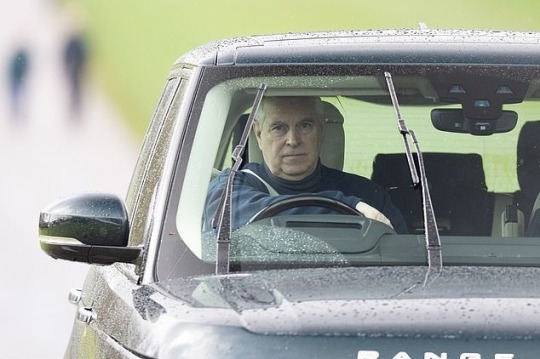
#Prince Andrew#the disgraced prince#fan fiction#royalty#Prince Edward#the duke of edinburgh#royalty fan fiction#british royalty fan fiction#randy andy fan fiction#the house of windsor series#the disgraced prince series
14 notes
·
View notes
Text
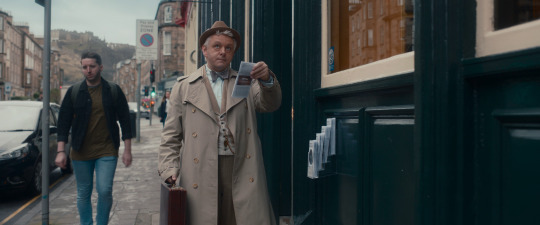



What I could read: :)
WHO WERE THE RESSURECTIONISTS?
MUNGO DALRYMPLE (1790-1829)
Perhaps one of the most notorious names asociated with The Ressurectionists was Mungo Dalrymple (1790-1829), an Edimburgh doctor who hanged himself in disgrace when it became public knowledge that he was buying cadavers from body snatchers, for his medical students to dissect.
Born in Carsphairn, Dalrymple had a meteoric rise to fame in the Scottish medical establisment when he became one of the Royal College of Surgeons of Edinburgh's youngest ever members at the age of 22. Dalrymple was passionate about the study of anatomy, giving many well received papers on the subject.
He was prine however to making enemies and earned a reputation for mercilessly skewering pomposity wherever he found it. This did not endear him to the senior doctors and surgeons of the Edinburgh medical establishment and Darlymple ruffed many feathers and as aresult had few allies when the bodysnatching scandal eventual broke.
FUN FACT Up until the 19th century, barbers carried out many surgical procedures in their shops!
...
Darlymple's downfall came when one of his suppliers, commonly known as 'Ressurection men', was suspected of murdering several of his lodgers in order to supply the doctor with a steady stream of cadavers. Eagle eyed landladies, Mrs Cat Clarke and Mrs Caro Clarke bravely confronted the murdere when he was attempting to conceal the body of his last victim in a barrel of pickled herring, and raised the hue and cry.
...
#good omens#bts#bts photos#cat clarke#caro clarke#fun fact#catriona mckenzie#hq photos#2ep3#mr darlymple#1827 minisode
545 notes
·
View notes
Text



The National Monument of Scotland, situated on Calton Hill in Edinburgh, commemorates Scottish soldiers and sailors who died in the Napoleonic Wars. Designed by Charles Robert Cockerell and William Henry Playfair, it was intended to resemble the Parthenon in Athens.
Construction began in 1826 but halted in 1829 due to lack of funds, leaving it incomplete with only twelve columns. This unfinished state has earned it the nickname “Scotland’s Disgrace.”
Despite this, the monument is a significant landmark, offering panoramic views of the city and symbolising Edinburgh’s neoclassical architectural heritage.
#scotland#scottish#travel#travel inspiration#places to visit#edinburgh#national monument of scotland#calton hill
186 notes
·
View notes
Text
History time:
Mr. Dalrymple, the eminent surgeon in episode 3 of S2 of Good Omens, appears to be inspired by Robert Knox, an Edinburgh surgeon famous because of his connection to the Burke and Hare murders in the 1820s.
He became an anatomist at the Edinburgh College of Surgeons in Newington and quickly developed a reputation as a lecturer that guaranteed him a steady flow of students, but as with Dalrymple in the show, the shortage of available cadavers was a constant and persistent problem in the city.
Since it gets a bit grisly, I'll pop it behind a thingie.
Graverobbing became so common that many of the graveyards in the city installed watchtowers to keep an eye on the graveyards and some of them had mortsafes put in place:

The coffins were locked in these cages to give the bodies time to get to the stage of decay that would render them useless to anatomists, then popped in a grave afterwards.
This is where Burke and Hare enter this story. They lived in the slums of the old town of Edinburgh and learned that the surgeons would provide money in exchange for fresh bodies, so rather than dig up the graves and risk the watchmen, they cut out the middleman and started murdering people for profit.
Robert Knox was their primary customer and he claimed to be oblivious to the crimes that were being committed, even though Burke and Hare were showing up with unsettling regularity with fresh corpses, but since they were killing the poor, no one was really paying much attention.
According to Mr. Knox, he thought the men were picking up corpses from the poor houses, though there is evidence that suggests he was aware of what was happening: one of the victims was a well-known boy with distinctive physical disabilities who would have been well-recognised. According to contemporary accounts, Knox had the young man's head, hands and feet removed, so no one would recognise him.
Since this could never be proven, he wasn't arrested for his part in the whole affair, but he was described as being "deficient in principle and heart" and public opinion spoke loud and clear. He left Edinburgh in disgrace and was eventually also debarred from teaching by the Royal College of Surgeons in England.
Eventually, laws were brought in to prevent grave robbery, but not before dozens of people were killed for profit.
414 notes
·
View notes
Text
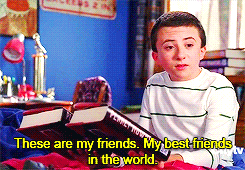
Fic Recs Wrap Up April 2024♡(੭ˊ͈ ꒵ˋ͈)੭*・:.。. .。.:*・゜゚・*☆
Mirror Mirror by epiphany_dex
Harry’s new year starts with a bang when he encounters Draco Malfoy at the Ministry Ball. Rec Post
(Never) Let Me Go by maraudersaffair @maraudersaffair
Harry and Ginny are married, but she abandoned him for her Quidditch career overseas. He is lonely and desperate for love and very interested in sleeping with a man. Then, one night at a party, Draco Malfoy whispers in his ear: Do you want to leave with me? Harry knows he should say no, especially since a scandal would ruin his chance at becoming Head Auror, but Malfoy is entirely too fit to pass up the opportunity. Rec Post
Another Mind Game by May_May_0_0
Harry’s occlumency reveals his disturbing home life which sets off a chain reaction that cannot be undone. Snape finds himself begrudgingly caring about the bespectacled boy, Harry discovers what it’s like to have adults who care, and Hermione finds herself becoming an accidental crime lord. Draco Malfoy is very much along for the ride, in all senses of the word. Rec Post
Dragons Don’t Know Paradise by teacup_tai @teacup-tai
In 2004, when Remus spends two scary weeks in the ITU due to complications of pneumonia and his HIV condition, Sirius walks around the house like a ghost and Harry finds comfort and strength in Draco through a chat in an online LGBT forum. Harry falls for him, but Draco has a lot of secrets and, before long, will need to come clean—even if he believes that no one is able to understand a dragon. Rec Post
Stalking Harry by orphan_account
Harry Potter is the most eligible bachelor in the Wizarding world. Draco Malfoy is a disgraced ex-Death Eater with emotional baggage and a bit of a crush. Rec Post
Through His Eyes (I Am Set Free) by Shewhxmustnxtbenamed @shewhomustnotbenamed
Harry and Draco have a telepathic connection that remains unexplained in both the Muggle and wizarding worlds. Draco is assigned a mission by Voldemort to locate and capture the Boy Who Lived– the trouble is that they don’t know anything about him. While Draco struggles to gather information on this mysteriously absent hero, he and Harry start communicating again for the first time since they were kids. Harry continues life as normal until he discovers information which compels him to abandon his ordinary Muggle life with the endeavor to rescue and emancipate his only friend– even if that means bartering with his own life. Rec Post
A Private Reason for This by Femme (femmequixotic) @femmequixotic
When the wife of a star politician in the Scottish Ministry turns up dead just outside Hogsmeade, Draco Malfoy and his murder investigation team are called in from the Edinburgh Auror force to find her killer. What DCI Malfoy doesn’t expect, however, is to have an ex from two decades past end up in his murder room, endangering not only his case, but also his heart. Rec Post
Consequences of Redemption by ominousflags @ominousflags
When Draco makes an impromptu decision to rescue Harry Potter from Malfoy Manor, the two find themselves completely alone and facing the looming climax of the war against Voldemort. Harry must start from the beginning with Draco–and starting over has more consequences than either of them anticipated. Rec Post
Double Trouble by multiverse_of_fanfic
Four years after the War, Draco is stuck in a dead-end job, paper-pushing his life away. Until one day, after a security breach in the Ministry, he receives an offer he can’t refuse. Thrown back into a world he thought he’d left behind, Draco must wrestle with his Death Eater past as well as his inconvenient — and forbidden — feelings for an annoyingly level-headed Harry Potter.
Will he manage to come out unscathed like he has most of his life, or will it all come crashing down? Rec Post
Here are a few more fics I've read recently that y'all might like to check out as well!(ノ゚∀゚)ノ━☆゚・*:.。. .。.:*・.*・。゚*:・゚✧
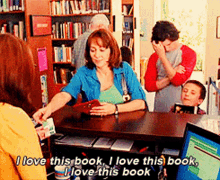
Weapons of Massive Consumption by SanderVanSunshine @sandervansunshine
Eight years after the war, Harry Potter lives a life of hedonism: raging parties, huge impulse purchases, and seemingly no worries. But it's Draco Malfoy—former Death Eater, lover of blueberry muffins, and bane of coffee shop workers—who starts to wonder if it's all a front, if something's actually terribly wrong with him. Why else would Potter ask Draco, of all fucking people, to write his biography?
What We Left Behind by peachydreamxx @peachydreamxx
Harry's recovering from an injury. Malfoy's recovering from heartbreak. Beaten down and bruised, Harry takes up Malfoy's offer to stay at his secluded seaside cottage in Dorset. It'll be good to get away from it all. It's only for a few days, and it's only so he can heal. Nothing else. Digging up past feelings will only make matters worse, and besides, Malfoy doesn't feel the same way. Does he?
Take You Home by lq_traintracks (lumosed_quill) @lqtraintracks
Everybody’s a little fucked up after the war, Draco especially. What starts as hate sex after a night out, eventually turns into something else, something more like comfort. And even though his friends all tell Harry he’s just being used, all Harry’s doing is making sure Draco gets home in one piece. He’s not falling helplessly in love.
Vipera Berus by Justlikewriting
Everything was fine. Draco resided at the Manor, made a decent living selling potions and most of his customers actually kept coming back despite his last name. Hence, Draco was fine. He really was. So what, if he was still waiting.
Title & Possession by Kbrick @kbrick
Harry Potter’s life is going well in the aftermath of the war. Sure, his house is dark and run-down and might hate him (while his house elf definitely hates him). But other than that, things are good. Except, yeah, okay, Hermione and Ron are no longer on speaking terms. Worse, they keep trying to get Harry to pick sides. But otherwise, Harry couldn’t be happier. Well. Except for the fact that Ginny is being super weird about their relationship and never wants to have sex or talk about the future. But other than that, Harry is perfectly fine, thankyouverymuch. At least, he is until Draco Malfoy sues him for ownership of Number Twelve, Grimmauld Place. Then Harry really isn’t fine at all.
( •ॢ◡-ॢ)-♡ I hope you enjoy these fics as much as I have! Happy reading, y’all! xoxo Carey (◍•ᴗ•◍)♡ ✧*💜💙💚💛❤💗💕💖
#Fic recs wrap up April 2024#Fic Recs Wrap Up#Drarry Fic Recs#drarry#Fic Recs#hp Fic Recs#harry potter#draco malfoy#hp#Harry Potter fic recs#Drarry fanfiction#Harry Potter Fanfiction#drarry fic#drarry smut#drarry squad#drarry fanart#hp fic#hp fanfiction#hp fanart#smut#hp smut#harry potter fanfic#harry potter fic#hp fanfic#HD Wireless 2023#Carey's Bookmark Fic Recs#carey's personal bookmarks#Long Post#My recs
62 notes
·
View notes
Text
Something Dark or Death
So there is that scene in episode 5 where Crowley says to Nina:
"Give me coffee or give me death. Funny name for a coffee shop."
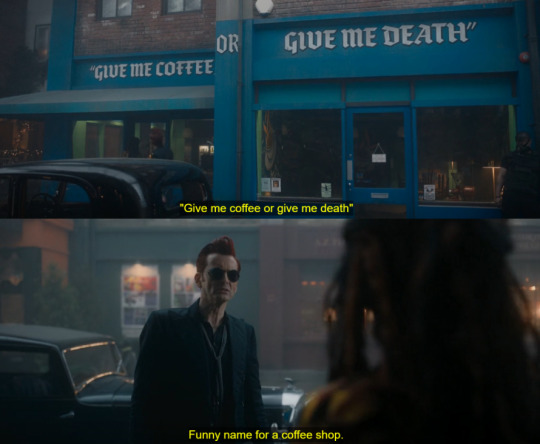
It's a strange time in the series to mention that now.
So I did what I always do when it comes to Good Omens at the moment… I look at the timestamp of the episode, when a suspicious line is spoken, and search for a fitting Bible verse with that number.
Here it is at minute 22:10. And this is the Bible verse (Revelation 22:10):
"Then he told me, “Do not seal up the words of the prophecy of this scroll, because the time is near."
It's from the Book of Revelation, you know, the prophecies of the last days before Christ’s return. The Second Coming.
So this sentence is important. I'm sure there is more to find and possible links to other metas. But for now, I want to focus on the funny name of the coffee shop.
Give me coffee or give me death. I say Neil loves words and their meanings. And Bible-related numbers.
So let's focus on the word "coffee". Why coffee? There could be any other shop, but without coffee, the hints that Neil wants to give us wouldn't work, I assume.
Coffee -from Arabic قَهْوَة (qahwa, “coffee, a brew”) -The "coffee" sense is ultimately of disputed origin. (…), the original meaning could have been "dark stuff," related to Hebrew כָּהָה (“dull, weak, dim”)
This post https://www.tumblr.com/gallup24/732418097410146304/the-clue-behind-them by @gallup24 introduced me to "The Exhaustive Concordance of the Bible" by James Strong. In short: it's a word index to the Bible. (It was used in season 1 for the room number of the hellhound = 2549, which is Strong's Number for "kakia" - meaning "wickedness", "evil").
According to Strong's Concordance, the Hebrew word כָּהָה (dark stuff) has the number 3543. You want to see what's going on at minute 35:43 of each episode in season 2?
Here you go:

Episode 1 = BEELZEBUB: No, it exists. Extreme sanctions.
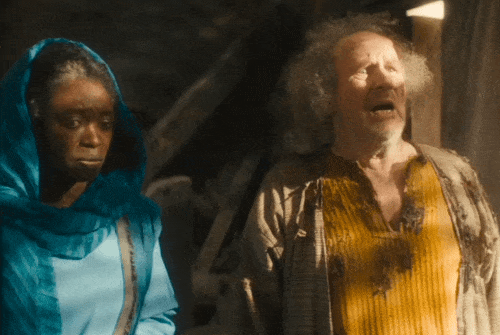
Episode 2 = JOB: Our children are dead?

Episode 3 = CROWLEY: Yes, whatever happened to him? AZIRAPHALE: He left Edinburgh in disgrace. And then he killed himself.
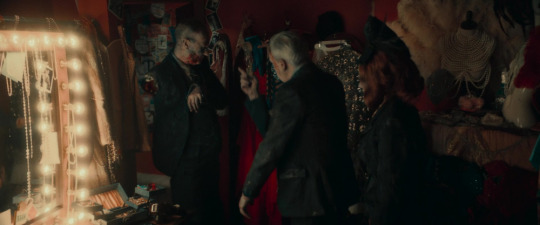
Episode 4 = (The Nazi Zombies leave the backstage room. Also their last scene in this season.)
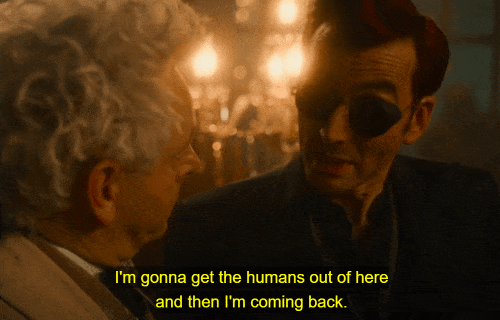
Episode 5 = The sentence starts at 35:42 but the second half is on point with the word "humans".
CROWLEY: (I'm gonna get the) humans out of here and then I'm coming back.
(This scene is about saving the humans from death, because Shax was ready to "(..)hurt them indirectly. We can definitely hurt them whilst battling angels. They'd be civilian casualties.")
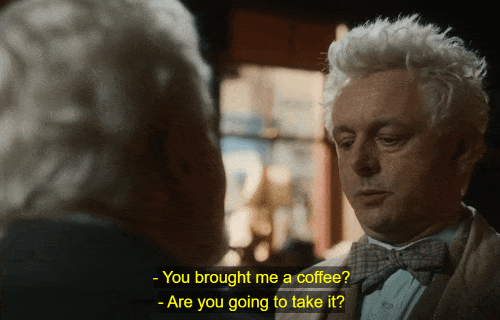
Episode 6 = AZIRAPHALE: You brought me a coffee? METATRON: Are you going to take it?
And this.. reads to me as a death threat. I don't think Aziraphale had a choice.
Maybe he thought that by accepting the Metatron's coffee and his offer to come back to heaven, he could prevent the "give me death" part. But he gets both.
The coffee means death. And not taking the coffee also means death.
Nina should rename her shop to "Give me coffee AND give me death."
#Take the coffee#and you get death anyway#good omens#good omens meta#good omens spoilers#good omens season 2
102 notes
·
View notes
Text
Prince Andrew, Duke of York
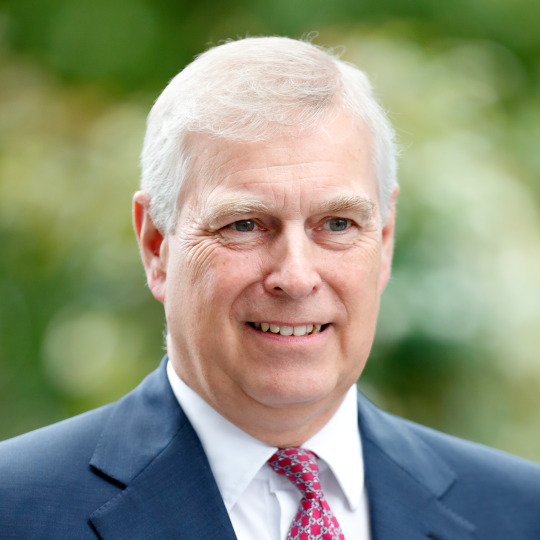
Physique: Average Build Height: 6'0"
Prince Andrew, Duke of York, KG, GCVO, CD (born 19 February 1960 -) is a member of the British royal family, the third child and second son of Queen Elizabeth II and Prince Philip, Duke of Edinburgh, and a younger brother of King Charles III. Formerly regarded as the beloved son of the queen and decorated naval officer, whose behavioral antics throughout his career as a Royal brought scandal and disgrace to the 1200-year legacy of the British Royal Family.

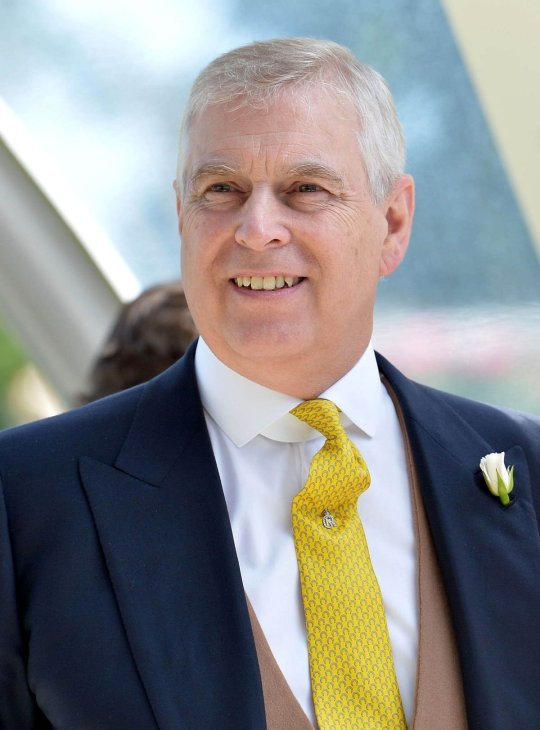
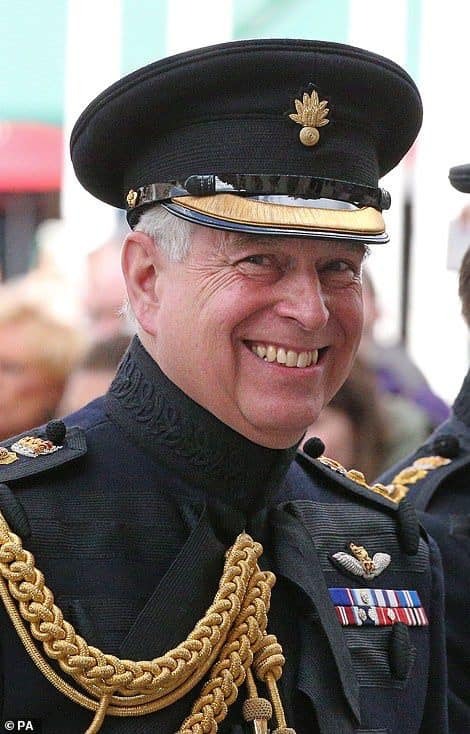


When I first took note of Prince Andrew, I thought he was the most fuckable member of the British Royal family. Well… until the whole Jeffrey Epstein scandal and King Charles III’s ascension to the throne. After that, I found out he was arrogant, self-indulgent, and thoughtless of other people’s feelings and does stupid things out of hubris, to show that he can do them. Plus the 72 teddy bears on the bed thing. Still there is something about Randy Andy that makes me still want to fuck him. I just can’t explain it.
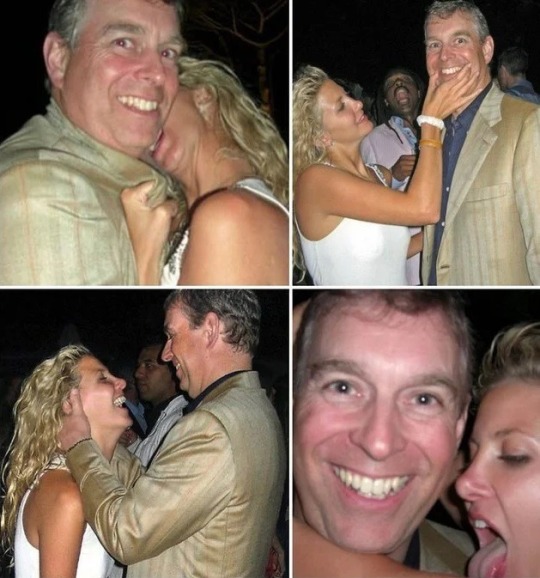
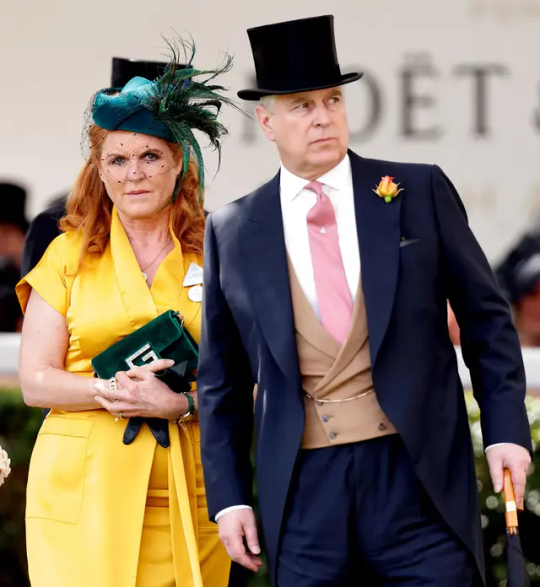
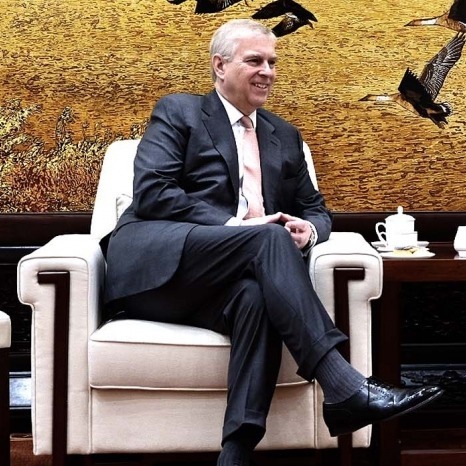
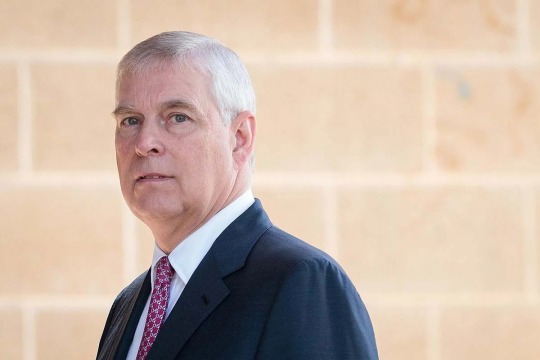
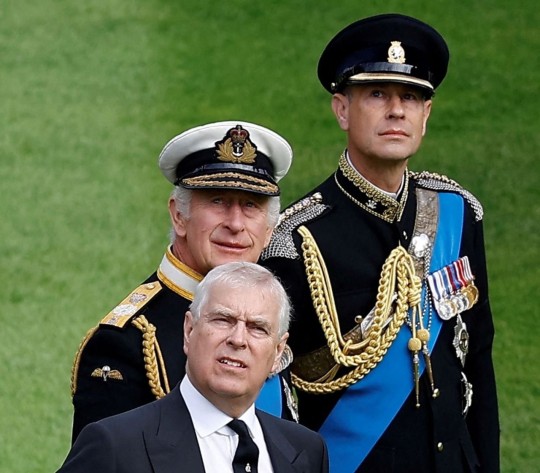
Currently, the disgraced Duke of York is stripped of his military and royal titles, stepped down from public duties and is living with his ex Fergie, including his daughters. Rumor has it, he’s looking to “reinvent himself.” And I’m more than ready to welcome him here and reinvent him… with my penis. What? I want to fuck a prince.
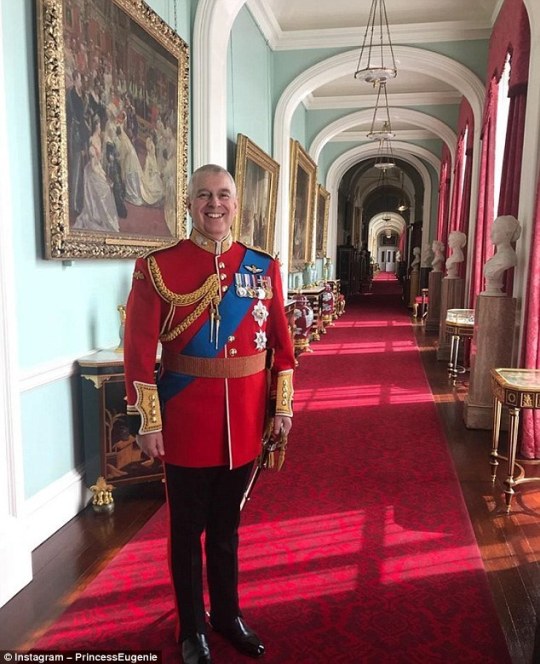
99 notes
·
View notes
Text
Every Instance of Lord Byron Hating On John Keats, Listed in Chronological Order.
“No more Keats I entreat — flay him alive. If some of you don’t I must skin him myself.”
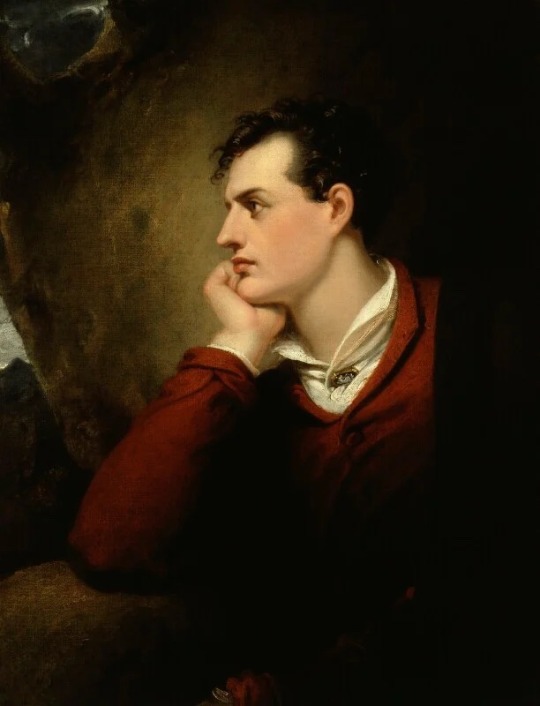
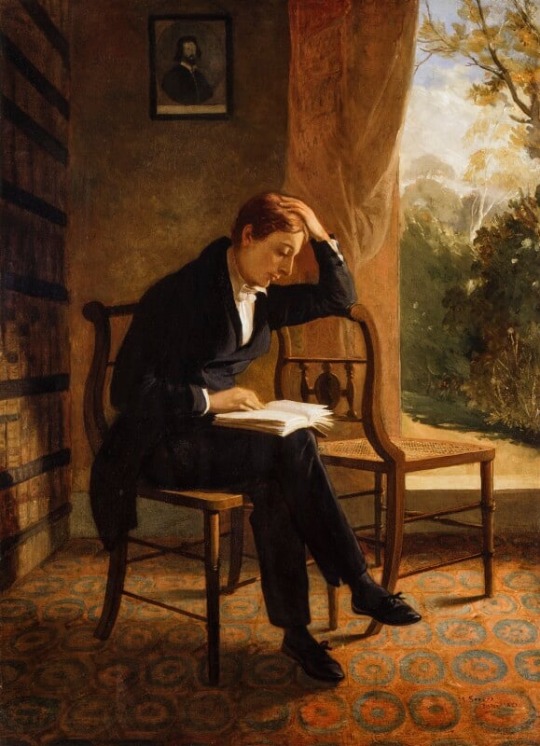
To his publisher John Murray, 12 October 1820:
“‘I’m thankful for your books dear Murray / But why not send Scott’s Monastery?’ the only book in four living volumes I would give a baioccho to see, abating the rest of the same author, and an occasional Edinburgh & Quarterly – as brief Chroniclers of the times. — Instead of this – here are John Keats’s piss a bed poetry – and three novels by God knows whom [..] Pray send me no more poetry but what is rare and decidedly good. — There is such a trash of Keats and the like upon my tables – that I am ashamed to look at them. [..] – I am in a very fierce humour at not having Scott’s Monastery. – You are too liberal in quantity and somewhat careless of the quality of your missives. – [..] No more Keats I entreat – – – flay him alive – if some of you don’t I must skin him myself. There is no bearing the drivelling idiotism of the Mankin. – – – – – [editor’s note: ‘dashes degenerate into scrawl’]”
To his publisher John Murray, 4 November 1820:
“They Support Pope I see in the Quarterly. [Let them] Continue to do so – it is a Sin & a Shame and a damnation – to think that Pope!! should require it – but he does. – – – Those miserable mountebanks of the day – the poets – disgrace themselves – and deny God – in running down Pope – the most faultless of Poets, and almost of men – – the Edinburgh praises Jack Keats or Ketch or whatever his names are; – why his is the Onanism of Poetry — something like the Pleasure an Italian fiddler extracted out of being suspended daily by a Street Walker in Drury Lane – this went on for some weeks – at last the Girl – went to get a pint of Gin – met another, chatted too long – and Cornelli was hanged outright before she returned. Such like is the trash they praise – and such will be the end of the outstretched poesy of this miserable Self-polluter of the human Mind [editor’s note: ‘untranscribable scrawl’]. W. Scott’s Monastery just arrived — many thanks for that Grand Desideratun of the last Six Months.”
Note: “onanism” refers to masturbation.
To his publisher John Murray, 9 November 1820:
“Mr. Keats whose poetry you enquire after — appears to me what I have already said; such writing is a sort of mental masturbation — he is always frigging his Imagination. I don’t mean that he is indecent, but viciously soliciting his own ideas into a state which is neither poetry nor any thing else but a Bedlam vision produced by raw pork and opium.”
Note: “frigging” was slang for masturbation.
To his publisher John Murray, 18 November 1820:
“P.S. — Of the praises of that little dirty blackguard Keates in the Edinburgh — I shall observe as Johnson did when Sheridan the actor got a pension. ‘What has he got a pension? then it is time that I should give up mine!’ — Nobody could be prouder of the praises of the Edinburgh than I was — or more alive to their censure — as I showed in English Bards and Scotch Reviewers — at present all the men they have ever praised are degraded by that insane article. — Why don't they review & praise ‘Solomon's Guide to Health’ it is better sense — and as much poetry as Johnny Keates.”
To his publisher John Murray 26 April 1821:
“Is it true – what Shelley writes me that poor John Keats died at Rome of the Quarterly Review? I am very sorry for it – though I think he took the wrong line as a poet – and was spoilt by Cockneyfying and Surburbing – and versifying Tooke’s Pantheon and Lempriere’s Dictionary. I know by experience that a savage review is Hemlock to a sucking author – and the one on me – (which produced the English Bards &c.) knocked me down – but I got up again. Instead of bursting a blood-vessel – I drank three bottles of Claret – and began an answer – finding that there was nothing in the Article for which I could lawfully knock Jeffrey on the head in an honourable way. However I would not be the person who wrote the homicidal article – for all the honour & glory in the World, – though I by no means approve of that School of Scribbling – which it treats upon.”
To Percy Shelley, 26 April 1821:
“I am very sorry to hear what you say of Keats — is it actually true? I did not think criticism had been so killing. Though I differ from you essentially in your estimate of his performances, I so much abhor all unnecessary pain, that I would rather he had been seated on the highest peak of Parnassus than have perished in such a manner. Poor fellow! though with such inordinate self-love he would probably have not been very happy. I read the review of ‘Endymion’ in the Quarterly. It was severe, — but surely not so severe as many reviews in that and other journals upon others.
I recollect the effect on me of the Edinburgh on my first poem; it was rage, and resistance, and redress — but not despondency nor despair. I grant that those are not amiable feelings; but, in this world of bustle and broil, and especially in the career of writing, a man should calculate upon his powers of resistance before he goes into the arena. ‘Expect not life from pain nor danger free, Nor deem the doom of man reversed for thee.’
You know my opinion of that second-hand school of poetry. You also know my high opinion of your own poetry, — because it is of no school. [..] I have published a pamphlet on the Pope controversy, which you will not like. Had I known that Keats was dead — or that he was alive and so sensitive — I should have omitted some remarks upon his poetry, to which I was provoked by his attack upon Pope, and my disapprobation of his own style of writing.”
To Percy Shelley, 30 July 1821:
[First page missing] “The impression of Hyperion upon my mind was – that it was the best of his works. Who is to be his editor? It is strange that Southey who attacks the reviewers so sharply in his Kirk White – calling theirs ‘the ungentle craft’ – should be perhaps the killer of Keats. Kirke White was nearly extinguished in the same way – by a paragraph or two in ‘the Monthly’ – Such inordinate sense of censure is surely incompatible with great exertion – have not all known writers been the subject thereof?”
To his publisher John Murray 30 July 1821:
“Are you aware that Shelley has written an Elegy on Keats, and accuses the Quarterly of killing him?
‘Who killed John Keats? / ‘I,’ says the Quarterly, / So savage and Tartarly; / ‘Twas one of my feats.’ / Who shot the arrow? / ‘The poet-priest Milman / (So ready to kill man), / Or Southey or Barrow.’’
You know very well that I did not approve of Keats’s poetry, or principles of poetry, or of his abuse of Pope; but, as he is dead, omit all that is said about him in any M.S.S. of mine, or publication. His Hyperion is a fine monument, and will keep his name. I do not envy the man who wrote the article; — you Review people have no more right to kill than any other footpads. However, he who would die of an article in a Review would probably have died of something else equally trivial. The same thing nearly happened to Kirke White, who died afterwards of a consumption.”
4 August 1821, to his publisher John Murray:
“You must however omit the whole of the observations against the Suburban School – they are meant against Keats and I cannot war with the dead – particularly those already killed by Criticism. Recollect to omit all that portion in any case.”
To his publisher John Murray, 7 August 1821:
“All the part about the Suburb School must be omitted – as it referred to poor Keats now slain by the Quarterly Review — [..] I have just been turning over the homicide review of J. Keats. – It is harsh certainly and contemptuous but not more so than what I recollect of the Edinburgh R. of ‘the Hours of Idleness’ in 1808. The Reviewer allows him ‘a degree of talent which deserves to be put in the right way’ ‘rays of fancy’ ‘gleams of Genius’ and ‘powers of language’. – It is harder on L. Hunt than upon Keats & professes fairly to review only one book of his poem. – Altogether – though very provoking it was hardly so bitter as to kill unless there was a morbid feeling previously in his system.”
To Thomas Moore, August 27th 1822:
“It was not a Bible that was found in Shelley's pocket, but John Keats's poems.”
From his poem Don Juan Canto Eleventh written October 1822 and published August 1823. He was going off the popular gossip shared to him by Shelley (who believed it), which was that Keats health had sharply declined due to receiving bad reviews:
“John Keats, who was killed off by one critique, / Just as he really promised something great, / If not intelligible, without Greek / Contrived to talk about the Gods of late, / Much as they might have been supposed to speak. / Poor fellow! His was an untoward fate; / ‘Tis strange the mind, that very fiery particle, / Should let itself be snuffed out by an article.”
To his publisher John Murray, 25 December 1822:
“As to any community of feeling, thought, or opinion, between Leigh Hunt and me, there is little or none. We meet rarely, hardly ever; but I think him a good-principled and able man, and must do as I would be done by. I do not know what world he has lived in – but I have lived in three or four – and none of them like his Keats and Kangaroo terra incognita – Alas! poor Shelley! – how he would have laughed – had he lived, and how we used to laugh now & then – at various things – which are grave in the Suburbs. You are all mistaken about Shelley – – you do not know – how mild – how tolerant – how good he was in Society – and as perfect a Gentleman as ever crossed a drawing room; – when he liked – & where he liked. – – – – –“
The excerpts above are taken primarily from Peter Cochran’s transcriptions.
#contrary to stereotypes byron wasn’t always like this - he just rly hated keats’ poetry#literature#english literature#dark academia#lord byron#romanticism#poetry#history#writing#john keats#letters#journals#interesting#1800s#regency era#19th century#english#books#bookblr#authors#writers#gothic literature#romantic literature#romantic poets#keats#byron#feuds#literary history#quotes#excerpts
122 notes
·
View notes
Text
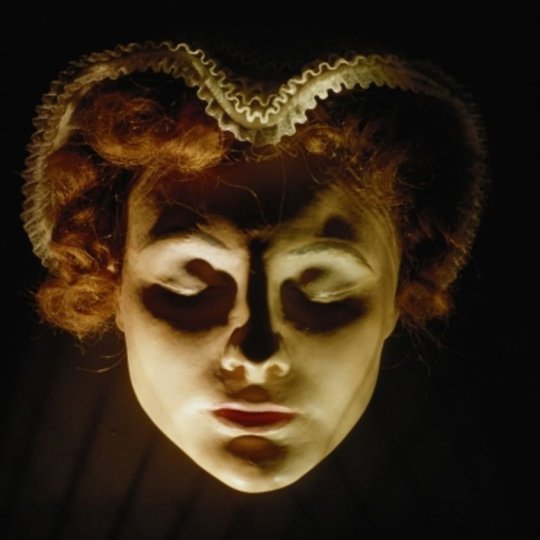
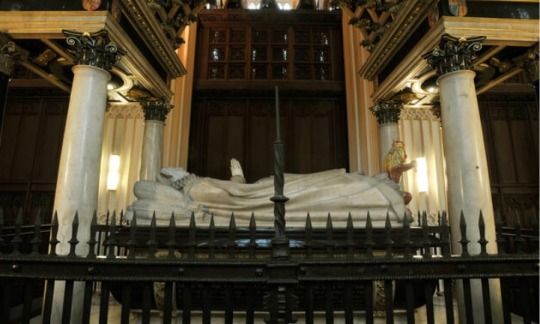
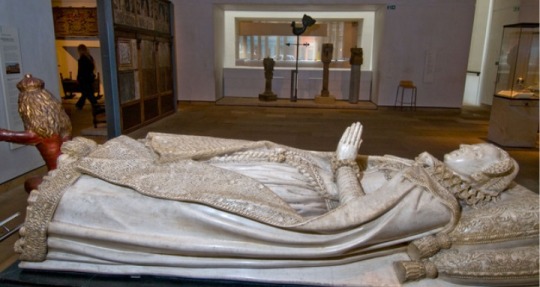
On February 9th in 1587, news reached London of Mary, Queen of Scots execution the previous day.
The people went wild with joy, church bells were rung out in celebration, guns thundered a salute, bonfires were lit in celebration and there were impromptu feasts held in every street.
Elizabeth however, did not greet the news with the same enthusiasm! It is said she had signed the death warrant in anger when she was told that Mary had plotted against her to be the figurehead of a Catholic uprising in England. It is also claimed that she withdrew the warrant but it was retained by her spymaster Walsingham.
Historians still debate how much Mary knew about the plot to overthrow Elizabeth.
It is a fact that the English Queen became almost hysterical. Her biographer William Camden, wrote that
“her countenance changed, her words faltered, and with excessive sorrow she was in a manner astonished, insomuch as she gave herself over to grief, putting herself into mourning weeds and shedding abundance of tears”.
Her rage was vengeful against those who had acted on her behalf. They had expected her anger, but not quite this extreme! Some fled home, others were banished, and Davison who had carried the warrant to Fotheringay, was imprisoned in the Tower of London.
Elizabeth wrote to James VI, telling him that his mother’s execution had happened without her knowledge, and whilst James at first displayed grief, he did not want to alienate Elizabeth, and told a group of angry nobles that he believed Elizabeth was genuine in her grief and would not do anything to effect the Anglo-Scottish alliance.
It was three weeks before news of Mary’s execution reached France, where there was widespread distress at the death of the King’s sister-in-law. The English Ambassador reported:
“I never saw a thing more hated by little, great, old, young and of all religions than the Queen of Scots’ death, and especially the manner of it. I would to God it had not been in this time”
On 12th March 1587 as a part of French national mourning a requiem mass was held at Notre Dame attended by Henri III, Catherine de Medici, and many of Mary’s Guise relations including her uncle, Elbeuf. A moving eulogy was given by Renauld de Beaune, Archbishop of Bourges, recalling the days of her youth and the spectacle of her magnificent wedding ceremony in Paris. It seemed to him ‘as if God had chosen to render her virtues more glorious than her afflictions’. She had become a cult figure.
It’s a disgrace the Scottish nation were denied a similar mark of respect for Mary, remember many Scots still thought of her as our rightful Monarch, although it has been said that in Scotland there was displays of anger towards Elizabeth for what had happened - despite the fact that they had forced Mary’s abdication twenty years earlier.
In the eyes of Catholic Europe, Mary was a Martyr, wrongfully put to death by the ‘heretic Elizabeth’. Philip of Spain believed it was his duty to avenge Mary’s death.
Nevertheless, Scotland and France did not act in revenge for Mary. Philip did however, with the Armada as we know. But this did not quite have the desired affect, thanks largely to the weather. It is ironic to think that Mary’s death gave both herself and Elizabeth their finest hour, Mary became the Martyr that she wanted to be, while Elizabeth became 'Gloriana’, with the “heart and stomach of a King”.
I will finish this post and go back briefly to Mary’s execution. Those present that day spoke of her great courage and dignity, just under 61 years later her grandson Charles I was also executed with the same bravery shown, whatever the faults or follies of the House of Stuart, its sons and daughters, with rare exceptions, have at least known how to die.
The pics show the death mask of Mary, her tomb in Westminster Abbey and a replica in The Museum of Scotland, Edinburgh.
34 notes
·
View notes
Text
Rewatching the bit with The Resurrectionist pub and the sign (along with all of the other clues throughout the season) is such beautiful foreshadowing for The Second Coming but also for Aziraphale’s choice in the finale (assuming the coffee theory isn’t correct.)
@azirafuck did a post (below) that is so spot on and makes so much sense to me -

- and I think that was such a pivotal moment for Aziraphale and his character development and that exploration of good vs evil and morality. I mean the whole season explored and built on that so wonderfully and the shades of grey idea.
And I think the idea of Dr Dalrymple leaving Edinburgh in disgrace and being seen as making the wrong choice even though he was trying to do good and make things better is a wonderful reflection of Aziraphale’s choice and motives in the finale so I think having those two sides of the pub sign is not only a lovely reflection of good vs evil and the different perceptions of which is which, but also a beautiful reflection and as I said, foreshadowing of where Aziraphale’s choice to try to do the right thing might lead…
#aziraphale#good omens#good omens spoilers#gos2#gos2 spoilers#good omens season 2#good omens season 2 spoilers#neil gaiman
62 notes
·
View notes
Text
Top or Bottom: Prince Andrew

The third child and second son of Queen Elizabeth II and Prince Philip, Duke of Edinburgh, and a younger brother of King Charles III. Andrew was born second in the line of succession to the British throne and is now eighth, and the first person in the line who is not a descendant of the reigning monarch.
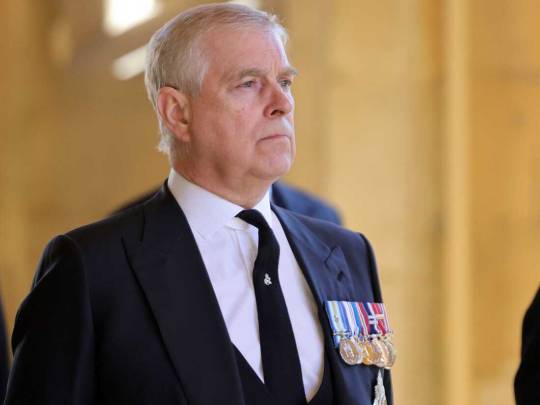
When I first took note of the disgraced Duke of York, I thought he was the most fuckable member of the British Royal family. Well… until the whole Jeffrey Epstein scandal and King Charles III’s ascension to the throne. So he has/had total top energy.

But… He also seems like the type that if you get the dick in him, he'd be a slutty bottom.

But… He was arrogant, self-indulgent, and thoughtless of other people’s feelings. So the chances of that happening are low.
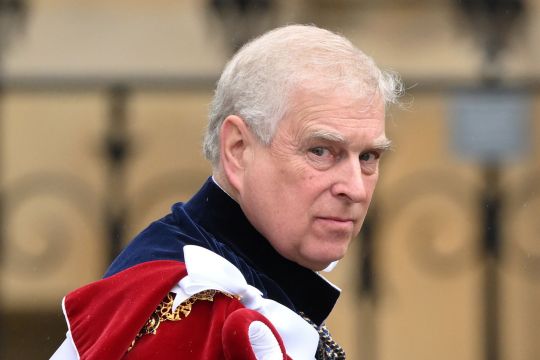
So in conclusion, I say top… until you get the dick in him.
35 notes
·
View notes
Text
At first I wasn’t particularly inclined to watch Matt Walsh’s documentary What is a Woman? I know the answer to that one already. Everybody does.
A woman is someone who isn’t allowed a final say on what a woman is. Pretending not to know this — that defining “woman” is incredibly complex and bewildering — is an age-old tactic deployed by non-women, usually in order to excuse treating us badly.
Are women fully human? Do they have souls? What do women want? Far greater men than the host of The Matt Walsh Show — Aristotle, Thomas Aquinas, Sigmund Freud — have tried and failed to answer these questions (they could always have asked an actual woman, but first they’d have had to establish whether women can think, and then they’d have been back to square one).
As Matt himself says at the start of his film, “I like to make sense of things. Making sense of females is a whole other matter”, noting that “even astrophysicist Stephen Hawking” was “completely dumbfounded by women”.
Even astrophysicist Stephen Hawking! Honestly, ladies, if the author of A Brief History of Time hasn’t a clue what the hell we are, what hope do any of us have?
The thankless nature of the task may be why the twenty-first century version of The Woman Question has now been allocated to those somewhat lower down the male intellect hierarchy: Edinburgh fringe comedians, disgraced MPs, right-wing shock jocks, Owen Jones and Billy Bragg.
The proposal that a woman is anyone who defines themselves as a woman — and that no woman may say anyone isn’t a woman — has led to a particularly unimpressive stage of the debate, one which can only be described as the Summa Theologica meets incels r us.
On the bright side, it’s clear the men are bloody loving it. If you’re left-wing, it’s your chance to put those TERFs in their place after years of having to “do feminism” as part of the right-side-of-history package deal. If you’re right-wing, it’s your opportunity to own all those feminists who suggested female bodies weren’t inferior and that pink, fluffy ladybrains were a myth. As Walsh declares of his film, “the movie makes utter fools of educated elite liberals”. I’m guessing that’s the point.
I confess to having known very little about Matt Walsh up till now. “I’m a husband, I’m a father of four, I host a talk show, I give speeches, I write books,” he tells us by way of introduction. Hey, that sounds nice! Alas, a quick perusal of his twitter account shows that he’s the kind of renaissance man who tweets things like “feminism is an ugly and bitter ideology” and “rapists love abortion. It helps them cover up their crime”.
He’s also the kind of man who, should feminists show themselves to insufficiently appreciative of his recent woman-defining efforts, tells us we would “rather be a victim than win the fight” and that we “just want to sit on the sidelines and whine”. He’s been, like, getting death threats due to his challenge to contemporary gender mores! Would you risk that, eh, feminists? What’s anyone ever done to you, JK Rowling, you massive coward?
I first wrote about the problematic nature of a gender identity-based definition of women over eight years ago. Other women, such as Julie Bindel, were sounding the alarm far earlier, and with little support. I know we’re supposed to be eternally grateful to Matt for stepping into the breach. What a gent! As the Onion once put it, Man Finally Put In Charge of Struggling Feminist Movement (admittedly it’s a man who thinks feminism is an ugly and bitter ideology but hey, we can’t have everything).
In any case, I gave in and watched Matt’s film, just on the off-chance I’d missed something (more fool me; I read Gender Trouble on that basis, and look where that’s got me). There was little in What is a woman? that I didn’t already know from the work of feminists themselves, but that’s no reason to discount it. What’s wrong with alerting the normies to the excesses of trans activism too?
Walsh never acknowledges the role his own rigid beliefs play
Perhaps the most difficult thing about conveying the absurdities of extreme trans activism to anyone who hasn’t yet encountered it, is that you either sound as though you’re making it up (usually in order to “stoke moral panic”) or the person to whom you’re talking concludes you must have missed some essential point (it would indeed be horrific if teenage girls were having their breasts removed due to social contagion and “progressive” institutions were cheering it on, therefore it can’t be happening. There must be something else afoot).
One of the great things about Walsh’s film is that he shows, first, that harmful things are indeed taking place, and second, that there is no hidden meaning behind them. The therapists, surgeons, academics and politicians to whom he speaks don’t suddenly pull back the curtain and reveal, yes, this is the reason why it isn’t total bollocks to claim that no one really knows what sex anyone is. That moment never comes (and believe me, I’d have loved it if it had. Being a Known TERF is a pain in the arse).
Instead they say things like “a chicken has an assigned gender” and that the word truth is “condescending and rude”. Ha! Aren’t liberals ridiculous? At one point Matt interviews someone who identifies as a wolf (or some other animal. I got bored and went to the kitchen for a biscuit at that point). What’s striking is that you sense his interviewees know on some level that they’re bullshitting. That’s why a number of them end the interview early, citing Walsh’s alleged bad faith as the reason why.
There are some genuinely moving sections to the film, such as the interviews with female athletes cheated out of prizes by the inclusion of males in the girls’ categories. The contribution from Scott Newgent, a trans man deeply concerned about the impact of medical transition on young females, was incredibly engaging. I could have watched a whole film on Newgent alone, as someone clearly driven by both personal trauma and compassion for others.
So why, overall, did the film leave a bad taste? Am I just an “ugly and bitter” feminist, peeved that a man has come along and claimed a number of feminist observations as his own? Am I a purist, unwilling to accept any support from anyone whose views don’t align precisely with mine?
I don’t think so. The problem for me is that Walsh never acknowledges the role his own rigid beliefs play in creating and perpetuating the current situation.
He finds countless people convinced that the only way to avoid imposing harmful social norms on individuals on the basis of their sexed bodies, is to pretend we can’t define said bodies or impute any social meaning to them at all. Yet he does nothing to suggest one shouldn’t impose said norms, or that his own pink/blue fantasies of girlhood and boyhood might be leading those who don’t conform to feel they are somehow “wrong”.
“Give my son a BB gun and that’s just about all the emotional support he needs,” he muses over a children’s party scene, all boys in blue jeans, all girls pink princesses. “My daughter on the other hand … I’ve heard people say that there are no differences between male and female. Those people are idiots.”
Hmm. I have three children, all biologically male, all of whom have played with dolls houses and worn dresses. Two of them have Frozen-style long blonde hair and I’ve never bought any of them a toy gun (nor have any of them asked for one).
Women are caught between two forms of misogyny
According to Walsh’s own gender ideology, I’m on the slippery slope towards the erasure of any stable definition of “male” and “female” at all. This is the mirror image of the absurdities of trans activism. Both Walsh and the people he interviews conflate sex difference denialism with the rejection of gender stereotypes. He thinks we should suffer the stereotypes; they think we should suffer the surgery. Feminists believe we shouldn’t suffer either.
There’s a particularly grim scene where Walsh attends a Women’s March, and delights in harassing female protestors who don’t want to give a precise definition of the word “woman”. Much as this reticence frustrates me, too, I know where it comes from. The polarised politics of the day has told these women they must choose between denying their sex and accepting an anti-choice, conservative vision of what it means to be an adult human female. It’s a vision Matt Walsh shares.
These women are caught between two forms of misogyny but to Walsh, it’s all “own the libs” fun and games. This man is not on our side, nor will he win over the women he lazily misrepresents as not knowing what’s good for them.
At the end of the film, Matt returns home from his gender odyssey to his waiting Penelope. She is, of course, in the kitchen, and happens to be struggling with a pickle jar.
“What is a woman?” he asks her.
“An adult human female — who needs help opening this!” she responds. Got it, ladies? He’ll defend our right to exist as a sex class, as long as we can all agree it’s the weaker one.
In the end, I’m just so fed up with the machismo. Last year I spoke to one of the founders of Woman’s Place UK, who told me sex-based rights will ultimately be defended best by those in it for “the victory, not the glory”. The people, mainly women, often lesbians and women of colour, who do the dull, behind the scenes work of compiling data and challenging unfair practices one by one. The people who aren’t seeking to reimpose other, equally oppressive beliefs about sex and gender.
It may be that What is a Woman? helps, by showing some still on the fence that the problem is real. Others, it may push in the other direction. Either way, women themselves won’t be thanked for their own hard work and significant risks.
After all, that’s just what being a woman is.
#What Is a Woman?#what is a woman#matt walsh#gender ideology#transactivism#trans#transgender#mansplaining#Victoria Smith#only men are qualified to decide what a woman is#misogyny
66 notes
·
View notes
Text
steadfast and dependable
James Norrington keeps his word: when Will Turner cannot be pardoned for his crimes, he sets the smith free to save his life. Elizabeth Swann keeps her word: when James Norrington fulfills the terms of their engagement, she marries him. They make the most of the situation, all until Cutler Beckett comes to the Caribbean to bargain for a compass. dmc au, ~6.5k words. not quite norribeth not quite willabeth but certainly both. yearn.
“You are going to great lengths to ensure Mr. Sparrow’s freedom,” Beckett says, taking his sweet time signing the documents. His hands do not waver, but neither do Elizabeth’s.
“This is not for Jack,” she snarls.
“Yourself and your husband, then, certainly,” he says mildly. It brings Elizabeth no peace that Cutler Beckett is the only other person in Port Royal who thinks James might still live. Beckett glances up and his pale eyes catch hers with almost casual indifference. “Two prisoners escaped that day last year, did they not? Is there someone else you thought to offer the last pardon?”
Will. Her heart echoes his name with every beat. Elizabeth refuses to rise to the bait, and says only, “Do not presume to know me.”
“The only thing you have to offer me is information — I do not see why such observations should not also be considered valuable.”
Elizabeth stuffs the pardons in her dress and makes to leave, still aiming the pistol. Even when she is out of effective range, Beckett does not move. “I’ll still be wanting that compass,” he says quietly, the plea almost lost to the beating of the waves just outside his window. His eyes glitter like a cat’s in the dark. “Consider that in your calculations.”
Like a ghost Elizabeth disappears into the night. Beckett had spoken the words into existence, and damn it all, she is considering it. If James is dead, then she, at least, can still live. There is no reason that Will Turner should not live with her.
I am disgraced enough as it is, she thinks, and laughs aloud into the night. Maybe now I am worthy to be a blacksmith’s wife.
It is easy enough to slip aboard a merchant ship sailing out of Port Royal. One extra seaman is not cause enough for alarum aboard the Edinburgh Trader, a heavy collier set to depart Port Royal in the morning. Elizabeth spends the long awful night tucked into the cramped quarters of the ship, rocking in the harbor, staring out the nearest porthole and wondering when she will return. She must return to save her father from Lord Beckett’s justice — but she will need Jack and Will to do it.
“This is not goodbye,” she whispers to herself.
But when the Trader departs in the morning, it feels finite enough.
(read on ao3!)
#pirates of the caribbean#james norrington#elizabeth swann#and. yknow. the rest of them!#*fic#in which james norrington is naked twice and one time is even saucy#is that incentive enough to make you guys read 6000 words of fever dream#willabeth#norribeth
38 notes
·
View notes
Note
Early Morning Kiss, Keith/Ewen
*rolls up five months late*
Here you go!
Ewen awoke to a clear dawn and Keith’s head heavy on his shoulder. Carefully extracting himself from his friend’s close embrace, he rose from the bed and opened the window to let in air, for the little room still carried the heavy scent of sweat and sex.
If the man Ewen Cameron had been a year ago, lying in misery in that draughty cell in Fort Augustus, could but see him now, his former self would have been startled beyond measure. He had hated Keith Windham in those dark days, so certain of the soldier’s part in his own betrayal of Lochiel. Yet it was not hatred now that burned in Ewen’s heart as he gazed down at the sleeping man, but a sentiment of the opposite nature entirely, one that he had become aware of all too late. At that first meeting on Loch Oich-side, fate had struck a rock from whence a fountainhead had sprung forth, carrying them along in its current, turning them this way and that, though neither Keith nor Ewen were aware of it. It had carried them to Edinburgh, to the shieling hut, to Fort Augustus, and to Morar. Five meetings, the prophecy had said, the first and the last by water.
And now the current had carried them here, to Paris and this little room. On hearing of the loss of Windham’s commission, his disgrace and subsequent discharge from the army, Ewen had invited him to Paris. Keith had accepted, and for a fortnight Ewen had agonised over every possible misfortune that might prevent this sixth meeting. He had not believed it when Keith had at last knocked on his door, and had only been persuaded of his friend’s presence once Keith’s arms were around him. And then Keith’s mouth had met his, and everything that Ewen had planned to say to Keith, all the pretty speeches and carefully chosen words, had vanished like smoke. In the end, there had only been two things to say — but even there, Keith had him beaten.
Tha gaol agam ort, he had murmured in clumsy Gaelic, holding Ewen’s face between shaking hands. Ewen could make no coherent reply, his heart beating frantically in his chest, and the hesitation made Keith withdraw and apologise. There had been only one thing to say to make it right.
“Come to my bed, Windham,” said Ewen, and before he could turn coward, caught Keith’s upturned face and kissed him.
Windham in sleep was a vastly different man to Windham awake. Gone was the soldier, the hard-faced man with the spine so straight and stiff it seemed to be made of iron. In his place lay the friend, the kindly lover whose boyish affections were given as freely as they were returned. Keith had laughed at some foolish thing Ewen had said as they hurriedly undressed, and his smile had been warm as he pulled Ewen down onto the bed with him. It had only been after, when shyness swept over them at last and they covered their nakedness, embarrassed by the vulnerability they had shown to each other, did some vestiges of the old Keith return, but these did not last. They could not. In the darkness they reached for each other, scarce believing that the other lay beside them, and remained closely entangled until morning.
Keith was awake now, though barely, and murmured Ewen’s name. Ewen slipped back into the bed and drew his friend once more into his arms. Keith gave a contented sigh, pressing his face into the crook of Ewen’s shoulder, a leg insinuating itself between Ewen’s.
“Good morning,” said Ewen quietly.
Keith groaned. “Do not wake me,” he said. “I was having the most marvellous dream…”
Ewen shifted himself so that he could look down at Keith’s face. “As did I,” he said. “I dreamt my friend came to me and told me of his love.”
Keith made a pleased noise and smiled. “I had that vision too,” he said, opening his eyes. In the uncertain light of dawn Ewen was caught by their remarkable colour, green one moment, brown the next, shifting in colour like the shallows of a loch. Keith reached up, his fingers tangling in Ewen’s unbound hair, his encouragement clear, and Ewen leaned down and met Keith’s lips with his own, the anxiety and weariness of their long separation slowly easing. If this was a dream, he prayed he might never awaken from it.
#the flight of the heron#anyways RIP to Lachlan who is within earshot of this reunion and is hating every moment of it#my writing
14 notes
·
View notes
Text
The Man from Black Water, Chapter 18
A/N From this point forward, the story diverges entirely from The Man from Snowy River, which ends when the Jamie character successfully retrieves the lost colt. Since I knew that simply wouldn’t fly, I’ve written Jamie and Claire the ending they both deserve. There is one more chapter to go, plus an epilogue.
Previous chapters can be found on my AO3 page.

Henry Beauchamp tore through Netherton like a hurricane, firing off orders left and right. The carriage was to be prepared to depart, provisions made to acquire two train tickets to Edinburgh and, most alarmingly, Claire’s trousseau was to be packed in a travel trunk.
“Rosemary,” he commanded, still breathing heavily, “you are to take Claire to Dundee and thence by train to the capital. Take this,” he handed over the hundred-pound reward into his sister-in-law’s waiting hand, “and arrange for her marriage. Some merchant’s son who won’t disgrace the Beauchamp name, but who isn’t going to renounce her if it turns out she’s been… sullied.”
“Father, no!” Claire cried from the foyer, where she’d overheard everything. “Jamie is a man of his word. He’ll be back for me in the spring. There is no chance I’m with child. You don’t have to do this!”
Henry ignored his daughter’s pleas, his mind made up. To her surprise, her aunt did not come to her aid, but instead began to pack her own travelling case.
“Aunt Rosemary, please. You have to tell father… I can’t just marry some strange man whose affections can be bought with money! I want to marry Jamie. I love Jamie!”
“Hush child,” Rosemary demurred. “You’re upsetting yourself unnecessarily.”
No matter how vociferously Claire protested, there was no moving either her father or her aunt. Shortly after lunch she was dragged towards the waiting carriage, still protesting loudly.
“I’ll never forgive you for this,” she vowed to her father, unaware she was repeating her mother’s exact words from twenty years before.
Henry’s jaw was set, but his eyes reflected immense pain.
“I hope one day you’ll realize that everything I’ve done, I’ve done for your future happiness.”
Claire turned away, unwilling to acknowledge her father as he raised his hand in farewell. With a crack of the whip, the carriage began its long journey. Looking out the window, Claire could make out Hamlet grazing placidly in his pasture. Whoever had set him free had the right idea, she thought grimly. Better to suffer in freedom than spend one’s life in a gilded cage.
***
The rolling motion of the carriage and the emotional exhaustion of the day sent Claire into an uneasy sleep. It was the sudden absence of the former that roused her from a strange dream that disappeared like smoke when she opened her eyes. Outside the window, the night was pitch black. A steady rain had begun to fall.
“Where are we?” she asked her aunt, who sat poised on the opposite bench as though awaiting some call to action.
Without warning, the carriage door opened, and a large figure draped in a dark wool shawl stuck its head inside. Claire scurried backwards on the velvet seat with a timid squeak.
“Have ye forgotten me sae quickly then, lassie?” the figure spoke. “An’ after I shared my best whisky wi’ ye too.”
Rosemary lit the oil lamp that hung near the carriage door, and the weathered, whiskered face of Murtagh Fitzgibbons sprang from the darkness.
“Murtagh!” Claire threw herself across the carriage and into the man’s waiting arms. “You have no idea how happy I am to see you.”
“Aye, I ken, lass. And if ye come wi’ me, there’s someone who I’ll wager ye’ll be even happier tae see.”
Glancing at her aunt, who nodded in encouragement, Claire stepped carefully down onto the sodden ground. Murtagh held his plaid over her head and guided her towards a nearby structure, slate grey and ominous. It was far too large to be a house, but it was only when the heavy wooden door gave way beneath Murtagh’s shove that she realized it was a simple country church. The inside was illuminated only by several lit tapers on the altar, but their capricious light was sufficient to show the figure of a man kneeling in prayer, his hair mirroring the orange glow of candlelight.
Claire was running down the aisle and into her beloved’s arms before he even had time to stand.
“Sassenach!” he exclaimed, cupping her jaws gently and turning her face towards the candle glow, looking for any sign of injury. Besides the traces of a few dried tears, she appeared unharmed.
“How did you know I was coming?” she sputtered, still disbelieving she was in Jamie’s arms. “I was certain I’d never see you again, and my father…” the rest of the words got clogged in her throat. Jamie made a low hushing sound, like she’d once heard him direct at Hamlet when he was fretful.
“I didna ken ye’d be here. Murtagh insisted on stopping at this wee church. Said we may as well ha’ a roof o’er our heads while we waited fer the weather tae clear. I found it strange, as he’s ne’er fussed o’er goin’ about when its uplowsin afore…”
Jamie petered off, head pivoting towards the back of the church. Murtagh and Rosemary stood side by side in the doorway, wearing twin expressions of smug satisfaction. Claire turned to follow his gaze.
“You knew!” she addressed her aunt with disillusionment tainting her voice. “You let me believe I was going to be forced to marry some stranger in Edinburgh, and all this time, you knew!”
“What?” Jamie interjected, his own temper now rising.
“I’m sorry, my dear,” Rosemary appeased. “I didn’t want to get your hopes up, in case the gentlemen weren’t here waiting for us.”
Murtagh grunted, a little perturbed that his devious credentials were being called into question.
“But why here, of all places? Couldn’t we have just met at the nearest crossroads?” Claire persisted.
“Claire…” Jamie’s shock had lifted, and he was looking at his godfather with newfound respect.
“Not now, Jamie. I’m in no mood to be forgiving when they could have…”
“Claire!” he interjected, tugging her by the elbow.
“What?” she spun to glare at him.
“May we have a moment alone, a goistidh, Miss Morriston?”
With a curt nod and a knowing smile, Murtagh led Rosemary back outside. As the door swung shut behind them, Jamie rose from the pew and began to pace.
“This wasna how I promised myself this would go at all,” he muttered loud enough for Claire to hear. Drawing himself up to his full height and squaring his shoulders as though preparing for battle, he came to stand before Claire and dropped to one knee.
“Sassenach. Claire. Claire Elizabeth Beauchamp, from the moment we first met, ye have proven again an’ again tae be the most intriguing, challenging, unnerving an’ passionate woman I’ve e’re met. Yer spirit speaks tae my soul jes as yer beauty favours my eyes. I’m no’ much o’ a prospect fer a wife, but if ye’ll have me, I shall spend my days makin’ yer life as comfortable as may be.”
Jamie took Claire’s left hand, chilled from the damp in the unheated church, and ran his calloused fingertips over her ring finger, silently grieving the absence of any token to offer her in witness of his vow.
“What say ye, Sassenach? Would ye care tae become a simple crofter’s wife?”
When Jamie dared to glance up from her delicate hand, the gold in Claire’s eyes had gone molten with tears. Her lips trembled upwards in a shaky smile.
“I’d care to become your wife, James Fraser, whoever you may be. There’s nothing in this world I want more.”
Letting out dual breaths of ecstatic relief, the young couple crashed together in a blissful embrace, words and murmurs of joy baptized by their tears.
“Jamie!” Claire laughed as their kisses grew increasingly passionate. “We’re in a church!”
“Aye, he’s a canny one, my godfather,” he replied, missing her point entirely.
“What do you mean?”
“I’d wager my boots he’s out there rousin’ the reverend, insistin’ he perform the ceremony.”
“What? Tonight?” Claire asked doubtfully.
Jamie’s boots were safe, because within an hour a sleepy but resigned minister had donned his vestments and was waiting in the chancel for the bride to complete her preparations in the vestibule. Jamie stood perfectly still before the altar, looking pale despite the warm tones of the candlelight.
“Breathe, lad,” Murtagh joked when he noticed his godson’s rigid posture.
Jamie dutifully inhaled, then exhaled his doubts.
“Am I bein’ honourable, a goistidh? Would my father approve?”
“Approve of ye marryin’ a lass ye care fer, an’ who clearly cares fer ye? When the alternative is her bein’ married off tae some ne’er do well in the big city?” Murtagh’s bushy eyebrows rose in disbelief.
“I canna judge if I’m bein’ selfish or no’. She’s the woman fer me, I’m sure of it. But am I the man fer her?”
Murtagh looked thoughtful. Jamie’s fingers tapped madly against the coarse wool of his trousers. He didn’t even have a clean change of clothes to don, let alone a ring to pledge his troth. When he pointed out these impediments to his godfather, the older man reached beneath his shirt, unfastening a simple chain he’d worn around his neck for as long as Jamie could remember. Dangling from the chain was a delicate silver ring.
“I had this made for Julia, twenty years ago, but I ne’er had the chance tae offer it tae her. Tis fitting her daughter should wear it.”
Jamie examined the finely wrought band, a continuous braid of three narrow strands, their intersections marked by engravings of Scottish thistle and English rose.
“Thank ye, Murtagh. Truly.”
With the rapidly warming metal pressed into his palm, Jamie regained some of his innate confidence.
“As fer yer other doubts,” Murtagh added, “I’ll share wi’ ye the wisdom o’ a man I greatly admire.”
Jamie listened carefully, eager to hear what he assumed would be his father’s advice.
“Claire can decide her future fer herself,” Murtagh pronounced with a significant tilt to his head.
Jamie had never been quite so happy to be bested by his own words.
***
Rosemary fussed with Claire’s hair, despite long ago coming to the realization that it couldn’t be tamed. The dress she’d magically produced from Claire’s trousseau was sufficiently matrimonial for the occasion, glittering like freshly fallen snow in the moonlight with silver embroidered leaves cascading down the bodice to the skirt.
“I can’t believe this is happening,” Claire whispered, not for the first time.
“You’re certain it’s what you want?” Rosemary confirmed.
“More than anything.”
Reaching discretely beneath her corset, Rosemary removed the money Henry had entrusted to her and held it out to Claire. Her niece looked at the pound notes as though they might burst into flames.
“Are you mad?” she finally spoke.
Rosemary shrugged.
“Your father told me to use this money to establish you in marriage. Use it however you desire, but it’s yours.”
The older woman looked off in the distance, revisiting the past in her mind.
“I’ve lived my entire life seeing what evil can befall a woman when she doesn’t control her own destiny. It led to your mother’s death. I won’t see it destroy you as well, my child. Julia would have wanted you to be free.”
Claire embraced her aunt with tears pooling in her eyes, speechless for once. Once she’d collected herself, she tucked the hundred pounds down the front of her own dress and gave a decisive nod.
“You’re ready?” Rosemary asked with her hand on the vestibule door.
“Je suis prête.”
***
The ceremony was simple. Five people stood within the halo of flickering candlelight, but two of them were in a world of their own. Jamie stared into his Sassenach’s gemstone eyes as the minister, no doubt familiar with the peremptory nature of certain Highland weddings, skipped over the liturgical niceties and straight to the binding portion of the rite.
“I, James Alexander Malcolm Morriston Fraser, take thee, Claire Elizabeth Beauchamp, to be my wedded wife. And do, in the presence of God and before these witnesses, promise and covenant to be a loving, faithful and dutiful husband unto thee until God shall separate us by death.”
With shaking hands, he placed her mother’s ring onto Claire’s finger, not at all surprised that it was a perfect fit. The shame he felt in his appearance, in his impoverished state, in Lallybroch’s inadequate appointments for a lady such as Claire, all melted away as he watched her lift her hand close to her face and examine the ring with a kind of reverent awe.
“Can ye kiss yer bride sae I may return tae my warm bed?” the reverend urged, shaking Jamie from his stupour.
“Aye. Wi’ pleasure.”
He couldn’t have imagined that kissing Claire could be any more euphoric than their previous encounters, but there was something deeper to the way their lips met and caressed. More meaningful. She tasted like his own secret well of delight.
“Well,” Murtagh coughed when they showed no signs of disengaging. “If ye’re quite done, the weather seems tae be liftin’, and t’will be dawn soon enough. We should be on our way.”
Claire’s things were transferred from the carriage to Murtagh’s cart, with a promise that they would be delivered to Lallybroch “after ye’ve had a chance tae, ahem, settle in”. Claire and Jamie would ride Donas up the glen, which only left Aunt Rosemary’s destination in question.
“Surely, you’re not thinking of returning to Netherton?” Claire asked, suddenly concerned for her aunt’s welfare once her father found out about her elopement.
“No, child. I only ever stayed on to watch over you, and that’s your husband obligation now, God help him,” she smiled sadly. “I have some modest savings and a train ticket to Edinburgh. I may as well go there.”
“Must ye go sae soon?” Murtagh inquired with a pained expression. “I was hopin’ ye might stick around. Tae see the lass settled, that is.”
“And stay in that dilapidated hovel you call a bothy?” Rosemary countered with a sniff, nevertheless following him down the path.
“Tis a fine dwelling,” Murtagh argued as he hopped into his cart and extended a hand to help the gentlewoman onto the seat beside him. “All it needs is a woman’s touch.”
Their two voices could be heard bickering long after their shadows had blended into the twilight. Jamie and Claire exchanged looks of giddy disbelief.
“Are ye ready tae go hame, Mrs. Fraser?” he asked as he helped his wife mount Donas behind him.
“As ready as I’ll ever be, Mr. Fraser. Take me home to Lallybroch.”
61 notes
·
View notes
Text
Prince Edward, Duke of Edinburgh
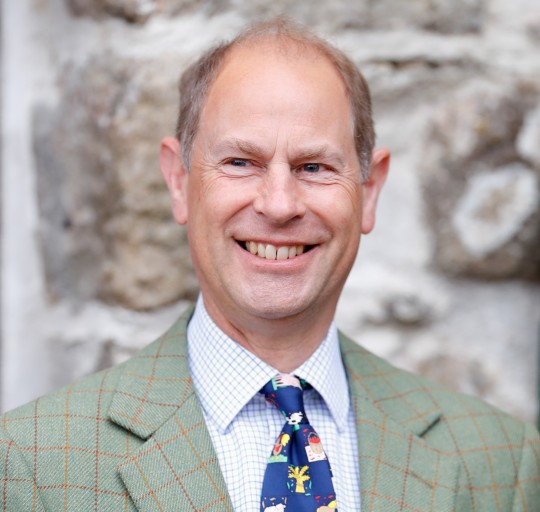
Physique: Average Build Height: 6'0" (183 cm)
Prince Edward, Duke of Edinburgh, KG, GCVO, CD, ADC (Edward Antony Richard Louis; born 10 March 1964-) is a member of the British royal family. He is the youngest child of Queen Elizabeth II and Prince Philip, Duke of Edinburgh, and the youngest sibling of King Charles III. He was born 3rd in the line of succession to the British throne and is now 14th.
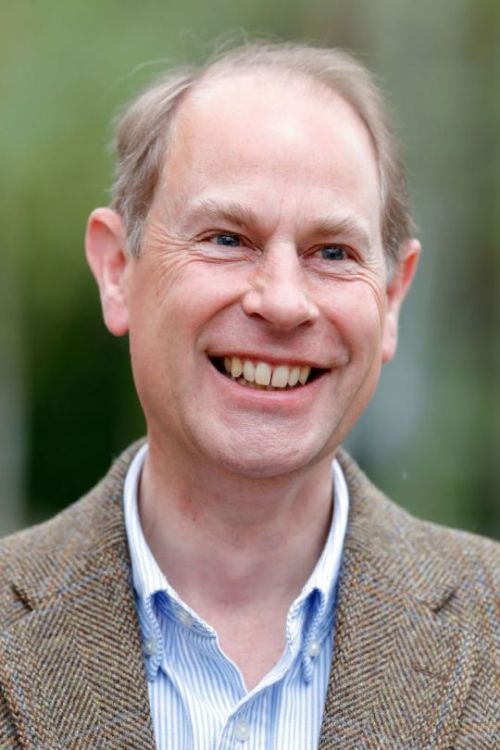
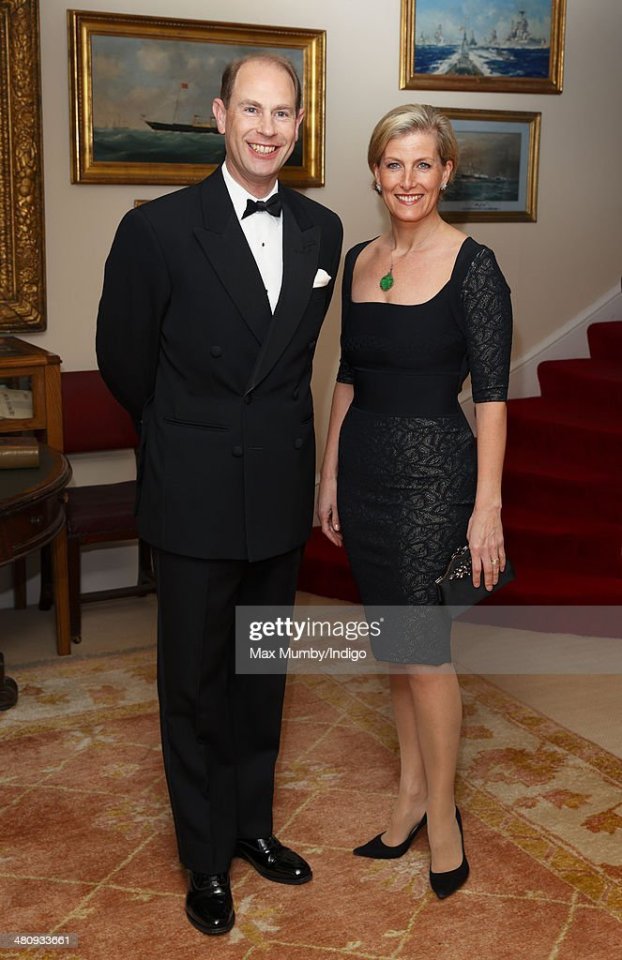
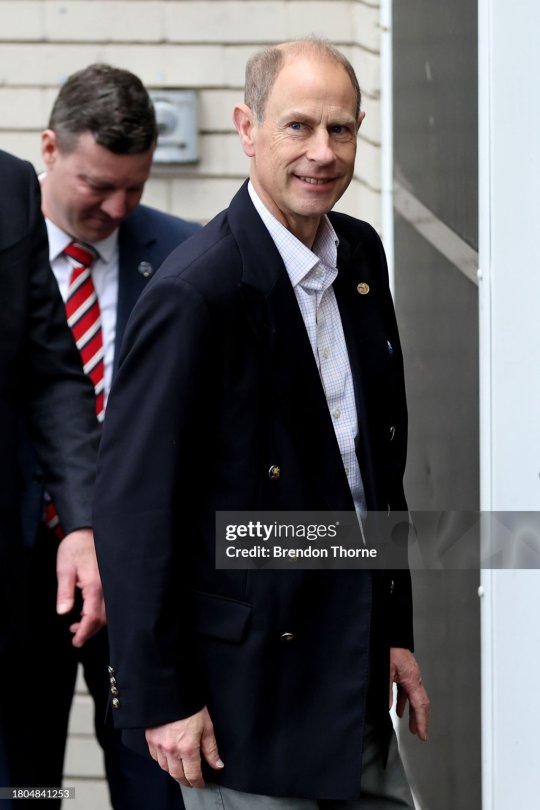


While not as desirable as Charles or Andrew, Edward does has something I’m finding attractive. Apparently in his youth, he was by far the most attractive British Royal to some and pinged to high heaven. What? He did work in theatre.
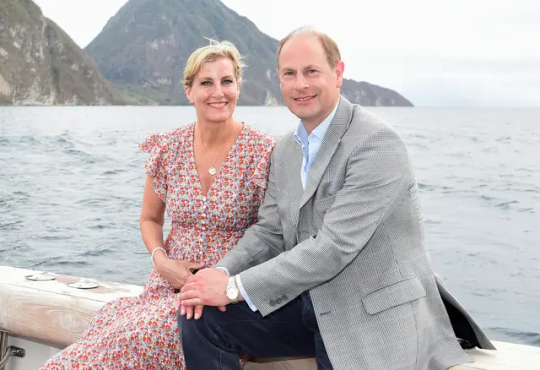

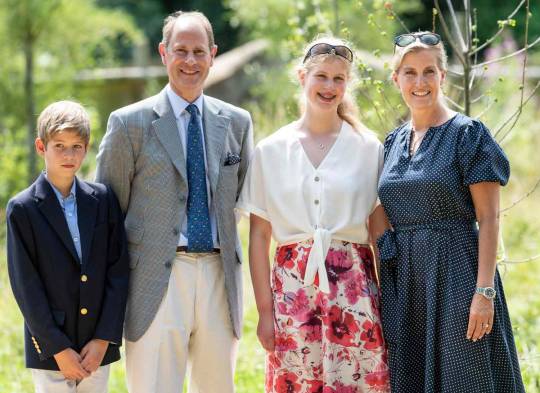
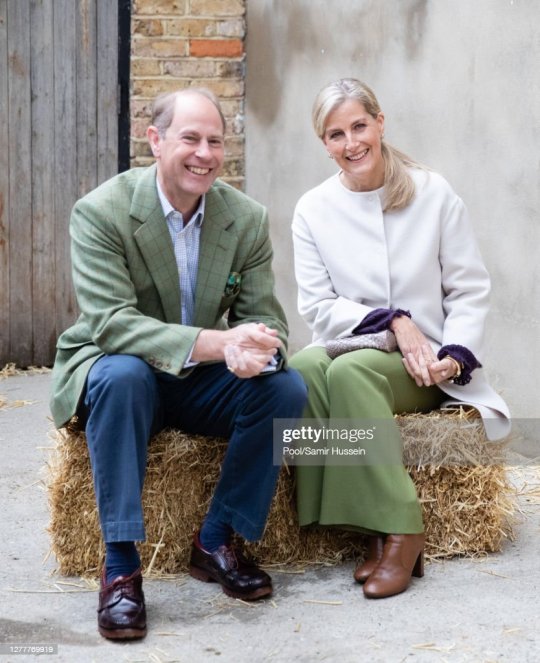
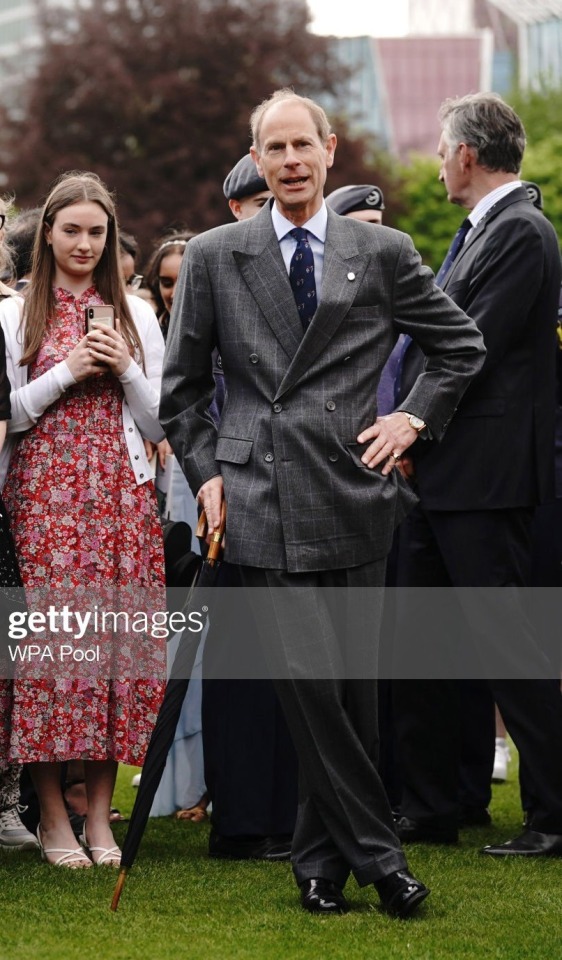
Married with two children, back in the early 90's, it's rumored he and some singer/actor were an item. Apparently it was the worst kept secret in town. Now with his parents are gone, his brother, King Charles III on a tear to economize the BRF and his other brother is a disgrace. Can Prince Edward finally live his true life? Rekindle the magic with his first real love? Keep a hot, ripped piece on the side (namely me). Indulge in his love of the (other) BBC without shame.
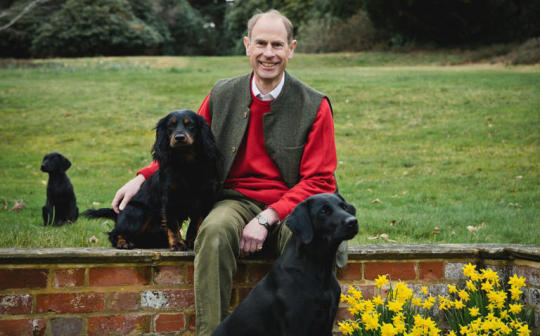
27 notes
·
View notes